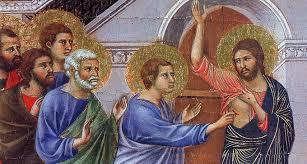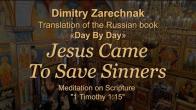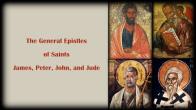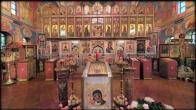You are here
BEHOLDING

9th Resurrection Gospel
(John 20:19-31)
Then the same day at evening, being the first day of the week, when the doors were shut where the disciples were assembled for fear of the Jews, came Jesus and stood in the midst, and saith unto them, Peace be unto you. And when he had so said, he shewed unto them his hands and his side. Then were the disciples glad, when they saw the LORD. Then said Jesus to them again, Peace be unto you: as my Father hath sent me, even so send I you. And when he had said this, he breathed on them, and saith unto them, Receive ye the Holy Ghost: Whose soever sins ye remit, they are remitted unto them; and whose soever sins ye retain, they are retained. But Thomas, one of the twelve, called Didymus, was not with them when Jesus came. The other disciples therefore said unto him, We have seen the LORD. But he said unto them, Except I shall see in his hands the print of the nails, and put my finger into the print of the nails, and thrust my hand into his side, I will not believe. And after eight days again his disciples were within, and Thomas with them: then came Jesus, the doors being shut, and stood in the midst, and said, Peace be unto you. Then saith he to Thomas, Reach hither thy finger, and behold my hands; and reach hither thy hand, and thrust it into my side: and be not faithless, but believing. And Thomas answered and said unto him, My LORD and my God. Jesus saith unto him, Thomas, because thou hast seen me, thou hast believed: blessed are they that have not seen, and yet have believed. And many other signs truly did Jesus in the presence of his disciples, which are not written in this book: But these are written, that ye might believe that Jesus is the Christ, the Son of God; and that believing ye might have life through his name.
What is signified by those closed doors of which the relater of these events speaks? Every single line of the account of events in the Gospel is essential. On Sunday, “at evening” adds yet another detail. At a late hour, in the evening, Jesus came to His disciples through doors that had been shut.
The doors of the Apostles’ upper room had been locked, and we know the reason why. Christ’s disciples were experiencing awful hours of internal and external feelings of abandonment. Three years earlier, they had left the world, had renounced everything for Jesus, and now Jesus had left them. After their Teacher was put to death, [it was expected that] executions of His followers in the city were soon to follow. Their fear for their lives was intensified by the fact that Peter and John had been to the tomb and had found it empty. Could the Jews have stolen away Jesus’ body? However, present in the room were Mary Magdalene, Mary the mother of James, and other women who had witnessed something unusual; they told of meeting the Lord, Who was radiant white, and of seeing bright white men sitting at the Tomb… The news given by the women was too unusual to make them forget the danger to their lives: Could not the Jews have stolen the Teacher’s body in order to destroy [the disciples], as they had destroyed the Teacher?... It was of utmost importance to keep the doors to the assembly locked.
And lo, through that locked doors, Christ entered into their company. How remarkably do the external events of the Gospels correspond to the internal events in the human souls finding themselves near Christ.
Let us reflect: After all, if the doors of the souls of Christ’s disciples had been open to Christ, would the disciples have been capable of locking the doors of their upper room? They would have ignored everything, the danger posed by the fanatical Jews and by the authorities; at the first bit of news of the Resurrection of Christ, they would have thrown open wide the doors of their assembly, and would have stood at the threshold in joyous fear and nervous anticipation.
Yet, Christ’s disciples locked their doors – first, the doors of their souls, as yet not enlightened by grace; and second, the doors of the room in which they had assembled. They closed the doors and locked themselves up. They locked themselves away, as it were, from grace. They left within themselves but a part of their freedom: the freedom to believe, and the freedom to doubt.
However... the doors being shut the Lord came, stood in their midst, and said, “Peace be unto you.” A second time He said, “Peace be unto you.”… “As My Father hath sent me, even so send I you. Receive ye the Holy Spirit.” Then he gave them the power to remit the sins of the world.
The disciples were weak, and did not have the strength to open the doors to their Risen Lord and Savior. However, “God is love.” God came into their midst despite the closed doors. He came to them and of course said to them what he would have said had the doors been open, and had their faith been stronger. Twice he granted the gift of peace unto his poor, weak children. He immediately sent them out to conquer the whole world, a world not at peace, a world in turmoil, in the grip of evil. “Receive ye the Holy Spirit…” and he gave them immeasurable power: both to forgive and not to forgive sins.
God has such an inexplicably lofty attraction for His beloved creation, for weak, impotent, lowly creation. Truly, God is the Father, the most loving, most blessed Father. God does everything to man and for man. Come, O hardened hearts. The Lord passes through all the doors with which we have shut our souls away from Him. In His Resurrected Flesh, as a man, God enters into each of us and says to each of us, “Peace be unto you.” He shows us – not to our eyes but to our souls – His hands and feet, pierced in expiation of human sins, and says to our yet doubting souls, “Blessed are those who have not seen, and yet believe.”
It is here that we have free will either to accept or not accept God.
Archbishop John (Shahovskoy)
Relics in cathedral - monthly calendar
| S | M | T | W | T | F | S |
|---|---|---|---|---|---|---|
|
|
1
|
2
|
3
|
4
|
5
|
6
|
|
7
|
8
|
9
|
10
|
11
|
12
|
13
|
|
14
|
15
|
16
|
17
|
18
|
19
|
20
|
|
21
|
22
|
23
|
24
|
25
|
26
|
27
|
|
28
|
29
|
30
|
|
|
|
|
PARISH LIFE
Address of our Cathedral
Subscribe to our mailing list
While all the materials on this site are copyrighted, you may use them freely as long as you treat them
with respect and provide attribution on the Russian Orthodox Cathedral of St.John the Baptist of Washington DC.









